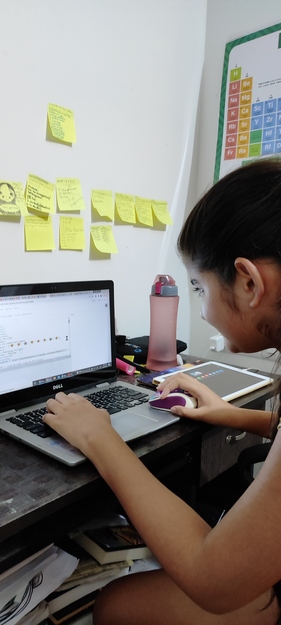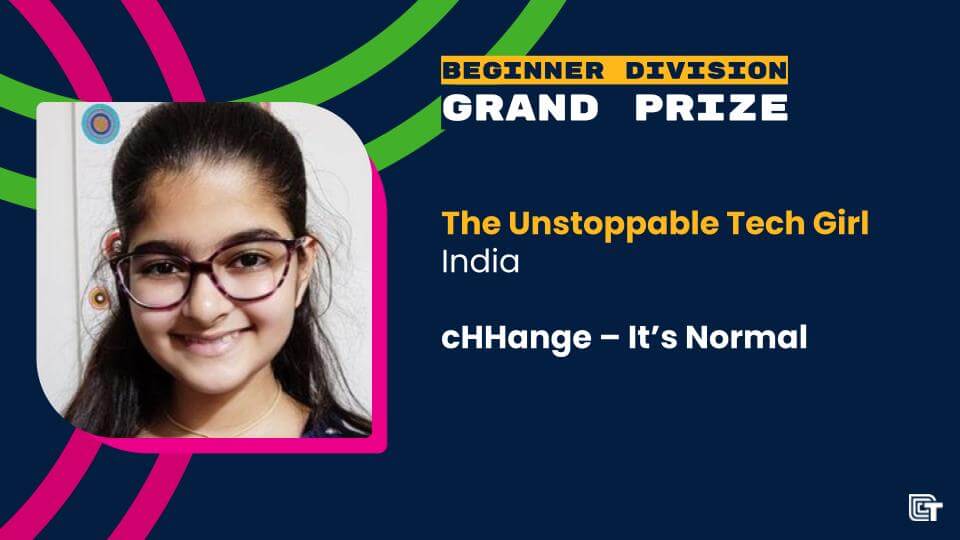Meet Our First-ever Beginner Division Grand Prize Winner and the Mentor Who Helped Her
There’s no denying it—Anika is impressive. At just 12 years old, she’s learning subjects well-beyond her grade level, like quantum physics and pre-calculus. She’s an avid reader, a huge sci-fi fan, and is even writing her own fiction series. Oh, and of course, she created an award-winning app for the Technovation Girls competition.
Anika started coding in 2nd grade, when she was just seven years old. Her third grade teacher encouraged her to join Technovation, but she was too young at the time. [That was before Technovation launched our beginner’s division for girls as young as 8.] So she joined for the first time in 2021 and participated again in 2022.
Anika worked as a team of one, with the support of her mentor, Vivek, who she idolizes: “He is one of the most incredible people I know, I am eternally thankful to have met someone like him. He is so adventurous and inspiring.”
Vivek, a VP at Goldman Sachs, has been involved with Technovation since 2014 when he was part of a group that brought Technovation Girls to India. He is passionate about gender equity and education and has worked with many teams over the years, including one that was featured in the CodeGirl documentary. Vivek says that being a mentor for Technovation helped him develop his management skills, such as motivating teams, helping them overcome obstacles, and building consensus among team members.
When Anika first reached out to Vivek via Technovation’s platform, he asked her to connect him to her parents. He spoke with Anika’s mother, who told him that Anika had already vetted two other potential mentors but rejected them because she didn’t think they would be able to help her. She then checked Vivek’s profile on LinkedIn and thought he would be a better match.
Working Together
 Vivek and Anika met weekly on Sundays throughout the program season to work on her project. He was impressed with her maturity, focus, and dedication, especially given that she was just 12 years old. Sometimes, their sessions extended to over 3 hours of discussion, troubleshooting, planning, researching, and programming! They spent the first few sessions coming up with an idea.
Vivek and Anika met weekly on Sundays throughout the program season to work on her project. He was impressed with her maturity, focus, and dedication, especially given that she was just 12 years old. Sometimes, their sessions extended to over 3 hours of discussion, troubleshooting, planning, researching, and programming! They spent the first few sessions coming up with an idea.
Technovation encourages girls to tackle issues that they are personally impacted by. Anika chose to address puberty education. For Anika, most of her awareness about puberty came from media, so when one of her older friends was in a bad mood one day, Anika thought back to the shows and movies she’d seen and wondered if, like in those stories, her friend’s moodiness might be attributed to puberty. So she went home and turned to Google. She was surprised to learn that puberty is more than just an occasional bad mood, and really surprised to read about the changes that happen to adolescents’ bodies. She couldn’t believe that no one had talked to her about this yet.
Anika has a loving relationship with her parents, who have always been her biggest champions. They’re always pushing for what is best for her while supporting her to pursue her own interests, so she couldn’t understand how they hadn’t taught her about puberty, and she confronted them about it. Her parents spoke honestly with her and they agreed that it should be something that is talked about more openly instead of a taboo subject. Anika checked in with her friends and found that she wasn’t the only one that had been left in the dark about the realities of puberty. Anika had a problem she could solve, and decided to make an app to provide kids with accurate information on puberty.
Her app, CHHange*- it’s Normal, has four key features:
- Chat and Chill: a chatbot for kids to ask ANY question they have about puberty. Though kids may learn some basics in school, they may feel uncomfortable asking questions in front of their classmates. Having a chatbot makes it so that kids can privately get the accurate answers they need. It uses Dialogflow’s enhanced artificial intelligence to pick up on tones and intents of the user, responding with information that Anika personally ensured would be relevant and comforting.
- Information Library: When registering for the app, there is a short survey with questions like your age and gender. Your answers from that survey are used to customize the information that shows up in your information library.
- Game Time: This is a fun game to help cheer up teens experiencing moodiness by having kids try to match their expression to an emoji. Its code is remarkable, integrating 5 platforms/libraries (the ml5 library, Teachable Machine, p5.js, GitHub, and Thunkable) and cleverly utilizing machine learning.
- Connect: The feature uses a web-viewer to connect users to Kids Helpline, which is a free service where kids can reach out and speak with professional counselors about any questions or issues they are having.
*Chhange means ‘fine’ in Hindi
Anika had to do a lot of research to curate her information library with accurate, age-appropriate information on puberty for both genders. Through this process, she learned a lot and was even able to debunk a few myths that she had been told about puberty. It was a challenge for her to learn more than what she herself needed to know about puberty as a mere 12-year-old girl!
Anika and Vivek used Technvation’s project plan to keep them on track, and eventually Anika was even able to get her app published in the Google Play store, but it wasn’t easy. “There were innumerable challenges,” Anika said. She watched a ton of tutorials but still hit many roadblocks along the way. There was a $25 fee for a Google developer account, and once she paid that, she had to wait for verification. Then another roadblock was that she had her app saved as an APK file, but Google only accepted AAB files, so they had to find a converter that would change APK files into AAB files without messing up any of the features of the app. She had to create a privacy policy that met the Play Store’s legal standards. And even after that, the first time she submitted it, she was denied approval because she had failed to provide sign-in credentials for Google to test it. However, the silver lining of being denied was that she was able to incorporate a few last minute updates that made the app even stronger for when she submitted it a second time and received approval.

For other girls who want to get their app published and bring their ideas to live, Anika has some advice:
My most important advice for other girls who want to get their app into the market is to never give up. Ever. I know, it’s cliche! But seriously. Don’t give up! They’re going to push you around and ask you for many details. You will most likely get rejected at first. You might not even understand anything! But don’t give up and keep editing your submission and fixing things, because it is absolutely worth the time and energy and effort. Because with your app on the PlayStore and App Store, your vision of solving your selected problem is practically met. Because now others are going to use your app.. Ask for help if you’re stuck! But never, ever, give up. You made an app. You solved a problem. You went through many challenges and obstacles to do this. Now share it with the world and make an impact. Go through a few more challenges. Push through it, because you’re worth it!
The Technovation Girls competition isn’t for the faint of heart. Creating apps, and getting them published can be challenging…but it’s also fun and exhilarating. We are so grateful for mentors like Vivek who help girls navigate through all of the highs and lows of these journeys. And we are so inspired by Anika, and by all of Technovation’s teams this year, for learning new skills, for persevering through challenges, for solving real problems, and for being changemakers for their communities!
Registration for the next season of Technovation Girls opens in October. If you’re interested in joining, sign up to get an email letting you know when you can register.

